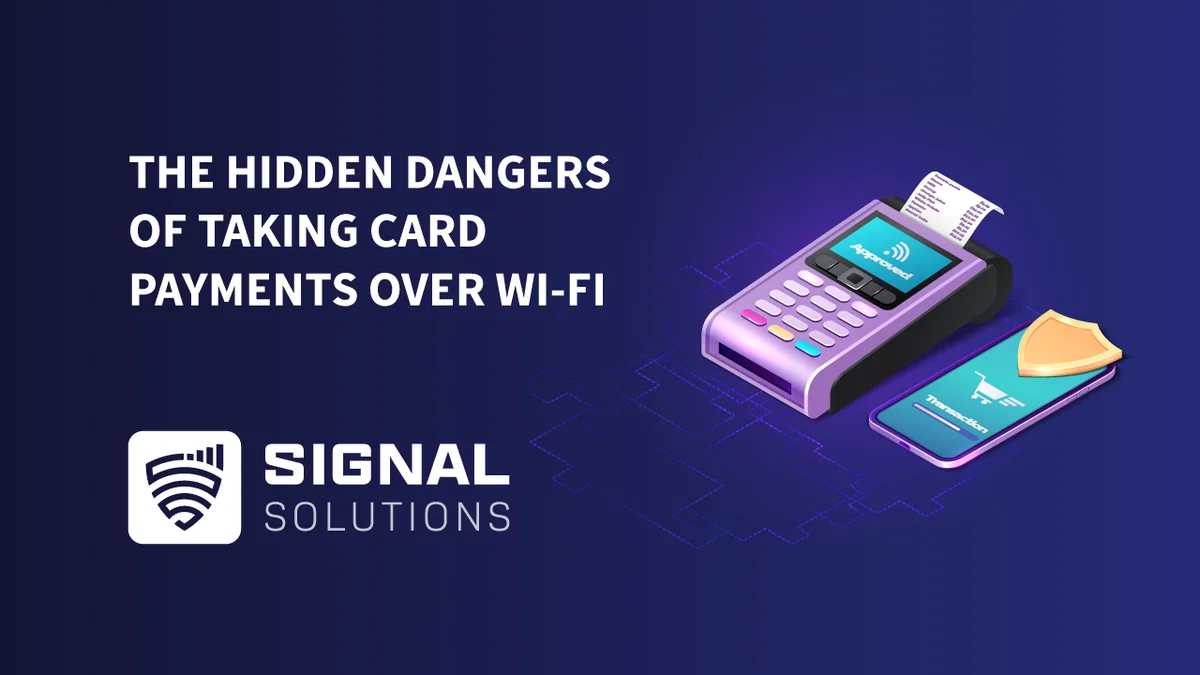
The Hidden Dangers Of Taking Card Payments Over Wi-Fi
The Payment Card Industry Data Security Standard (PCI DSS) is a mandatory set of security requirements developed by the major card brands (Visa, Mastercard, American Express, Discover, and JCB) to safeguard cardholder data.
All UK businesses accepting card payments, whether over Wi-Fi, cellular or other networks, must comply with PCI DSS. Failure to comply not only increases the risk of data breaches but also exposes businesses to serious financial, legal, and reputational consequences.
When using wireless (Wi-Fi) networks for payment processing, the compliance burden is typically higher than for dedicated cellular terminals, due to additional risks associated with wireless connectivity.
Potential Penalties for Non-Compliance
1. Financial Penalties
Card scheme and acquirer fines: Non-compliance can attract fines from £4,000 to £80,000 per month, depending on the size of the business and the extent of non-compliance.
Breach-related fines: In the event of a data breach, fines can also be imposed per exposed customer record, significantly multiplying the cost.
Escalating penalties: Repeat violations usually lead to higher penalties and increased scrutiny from acquiring banks.
2. Increased Transaction Fees
Payment processors may impose higher transaction charges on non-compliant businesses, viewing them as higher risk. These additional charges erode profit margins and create an ongoing financial penalty until compliance is achieved.
3. Loss of Payment Processing Capabilities
Acquiring banks hold the authority to suspend or terminate business accounts if compliance is not achieved. Losing the ability to accept card payments can be catastrophic for any business reliant on card transactions.
4. Legal and Regulatory Consequences
UK GDPR and Data Protection Act 2018: A data breach involving cardholder data exposes businesses to regulatory investigations, fines, and legal claims. UK GDPR fines can reach up to £17.5 million or 4% of annual global turnover, whichever is higher.
Civil claims: Customers affected by breaches may pursue compensation claims, adding further financial and reputational burden.
5. Reputational Damage
Non-compliance that results in a breach damages customer trust and brand reputation. Negative publicity, loss of customer confidence, and the long-term impact on brand value often outweigh the initial financial penalties.
Specific PCI DSS Considerations for Wi-Fi
When payment terminals use Wi-Fi, the PCI DSS imposes additional security obligations:
Firewalls and segmentation: A firewall must be in place between the wireless network and the cardholder data environment (CDE). Guest Wi-Fi must always be separated from business networks.
Access restrictions: Only necessary traffic should be permitted.
Password security: Default vendor-supplied passwords are prohibited and must be replaced with strong credentials.
Policies and monitoring: Businesses must maintain policies for wireless usage and implement intrusion detection/prevention for ongoing monitoring.
Regular testing: Routine security assessments, including vulnerability scans and penetration testing, are required to validate ongoing protection.
These controls are more strict than those typically applied to dedicated cellular terminals, which are often treated as stand-alone and therefore may fall into a lower PCI DSS scope.
Overall, using Wi-Fi for payment card processing in the UK is permitted, but it comes with greater compliance responsibilities. Failure to meet PCI DSS obligations when using Wi-Fi exposes businesses to everything we've listed above.
In contrast, dedicated cellular payment terminals are often considered lower-risk from a PCI DSS perspective, reducing the compliance burden and penalties. If you're interested in boosting your mobile signal in order to help these problems, contact us today! Fill out our free solution design and quote through our website.
Recommendation:
Businesses should work with their acquiring bank, payment processor, and IT/security teams to ensure full PCI DSS compliance. Where Wi-Fi must be used, robust security controls, regular monitoring, and documented compliance are essential to protecting your business.